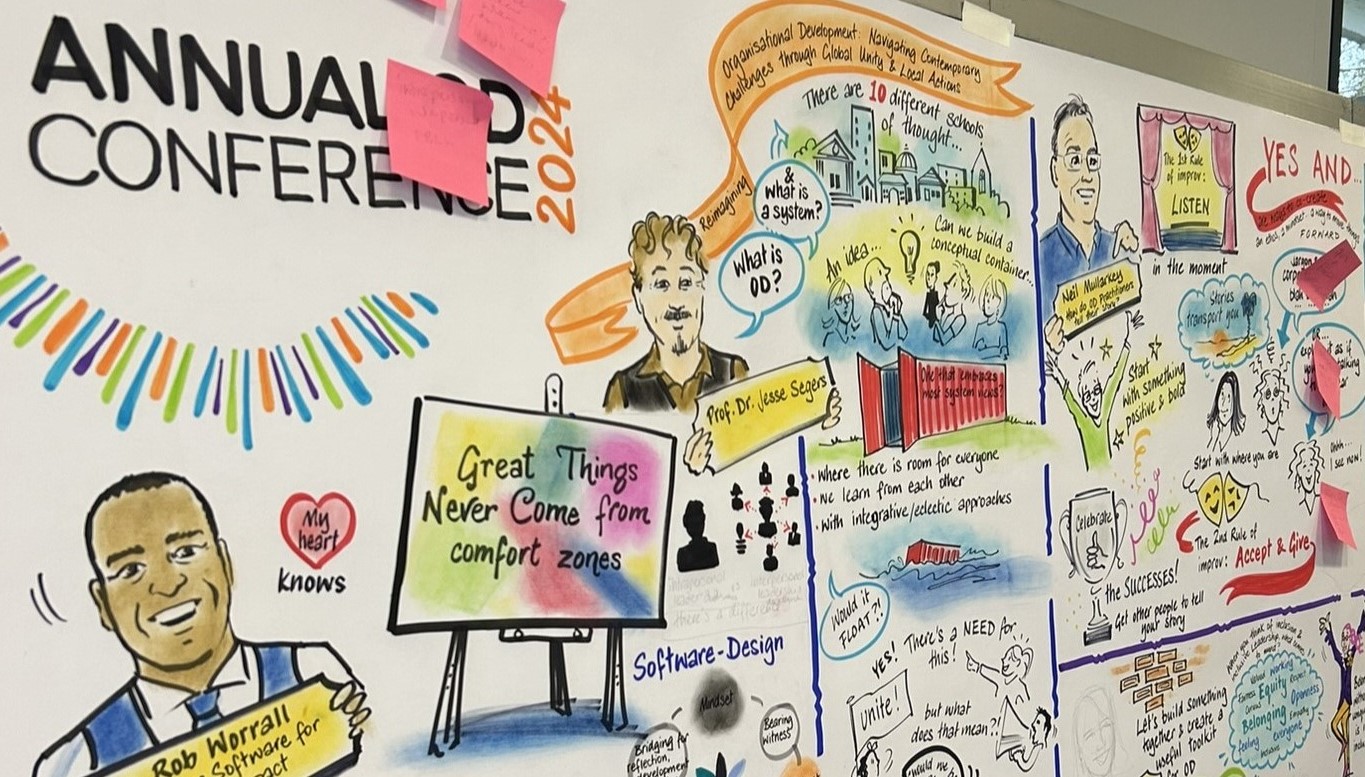People often ask, what is Organisational Development (OD)? But the reality is you might already be practicing it without necessarily realising. That was the case for Susanette Mansour, CEO of Croydon Vision and Organisation Development Practitioners (ODP) programme alumna.
Susanette told us, “The ODP affirmed a lot of what I already knew as well as giving me more structure and awareness, especially for the future.” Susanette is a qualified accountant (ACCA) and always enjoyed the performance management and change management side of accounting. “I love going into an organisation and together with the right people seeing transformation taking place.”
The grounding of Susanette’s practice lies in the power of working with people and empowering those around her. She explained, “When working in change management it is important to enable key stakeholders to lead rather than title focus. The leader’s role is to facilitate meetings that bring the best outcome, utilising early adopters and encouraging those sitting on the fence perhaps uncertain of what this change means for them.” This foundation was the beginning of the incredible transformation of Susanette’s workplace – the heart of a charity and the mindset of a business.
The importance of differentiation
During the covid pandemic, Susanette asked herself ‘How can Croydon Vision differentiate to implement a sustainable model that will support the organisation in years to come?’ The question became double important when Croydon Council announced bankruptcy, knowing the ripple effect could be with no or minimal funding. Something had to change. Croydon Vision being a charity meant that introducing price to a product that had always been free was going to have its pushbacks, so the initial introduction of the concept was challenging. Susanette explained, “When I first shared the idea, I received plenty of resistance, however in reading the room there were some interested parties eager to learn more. They were my early adopters and with time soon became the leaders and voices that drove the concept to actualisation.”
Understanding that sustainability would become an issue if the concept was not introduced, Croydon Vision agreed Susanette’s idea. In doing so, they also created a hardship fund for those who might be in financial difficulties, maintaining their charitable values. Some of the concerns were that there would be less footfall for services and less demand due to a price tag. Susanette said, “We listened and worked alongside the right people (influencers within), empowering them to go forward, to take action and to walk the corridors slowly with other members. It’s amazing to see a transformation taking place and members asking what they can do to support their organisation.” The below gives a synopsis of the change so far:
- Paid for services has increased from 22% to 75%
- 14% increase in membership footfall, leading to increased sales
- 19% increase in hall hire and rental income due to increased marketing
- A give back campaign of members becoming volunteers to promote services – almost 50% of the current volunteer team are members
- A hardship fund is now available, created by members and designed to include people in need
A culture of empowerment
What Susanette is most proud of is her contribution and commitment to transforming Croydon Vision from providing tea and sympathy to a collaborative model of taking ownership. This is about encouraging people with sight loss to ask what Croydon Vision can do for them as well as people asking what they can do for Croydon Vision. Susanette added, “Our focus is about giving people hope that there is life after sight loss, walking a journey with each person and transforming people’s lives from dependence to independence.”

This became possible through the creation of a strong culture of empowerment using Croydon Vision’s 5 steps collaborative model. People with sight loss take part in an evolution of learning skills with the end goal of giving back to the community. Susanette explained, “We are working to see many lives thrive after sight loss. This includes increasing employment, encouraging people to become ambassadors and scaling awareness of sight loss. We have created that culture of empowerment to say ‘You’re not alone and your journey might not be as quick as another person but that’s ok. We’re all on this journey together.’”
Croydon Vision is now raising awareness of sight loss in their community. For example, to improve service provision in supermarkets to enable people with sight loss to shop independently. When this is done well, we celebrate the businesses but when it is not, Croydon Vision approaches the organisation to suggest visual awareness workshops for their team. In fact, Susanette and her team provide awareness training to several organisations in Croydon and the surrounding boroughs.
A testament to teamwork
The shared peer support and networking aspect of the collaborative model is also very powerful, Susanette explained. For example, intergenerational learning allows younger people to meet with those at a working age and seeing them getting back into work gives them hope and inspiration for the future. Susanette said, “The people learn from one another to develop leadership skills and social skills – some have even graduated from universities to come back into their community and mentor others through their experiences. The culture of empowering one another is so important. We encourage the concept of taking ownership – this is your organisation.”
How does Susanette’s story relate to OD?
OD is a vast field and OD practitioners still struggle to agree on a definition. For Susanette, OD is all about working with the right people. It’s about how effective an organisation can be and it is about measuring impact in a tangible way that can cross-align with your strategy.





